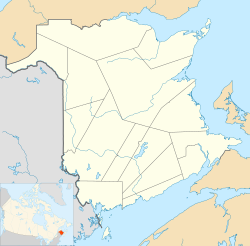This article may rely excessively on sources too closely associated with the subject , potentially preventing the article from being verifiable and neutral.(November 2011) |
| Dr. Georges-L.-Dumont University Hospital Centre | |
|---|---|
| Vitalité Health Network | |
 The Dr. Georges-L.-Dumont University Hospital Centre | |
| Geography | |
| Location | 330 Avenue Université, Moncton, New Brunswick, Canada |
| Coordinates | 46°05′53″N64°47′14″W / 46.0980°N 64.7871°W |
| Organization | |
| Care system | Public Medicare (Canada) |
| Type | Teaching |
| Affiliated university | Faculté de médecine – Université de Sherbrooke |
| Services | |
| Emergency department | Level III trauma centre |
| Beds | 423 |
| Speciality | Oncology |
| History | |
| Opened | 1922 |
| Links | |
| Website | Dr. Georges-L.-Dumont University Hospital Centre |
| Lists | Hospitals in Canada |
Dr. Georges-L.-Dumont University Hospital Centre is a hospital in Moncton, New Brunswick. It operates as a tertiary care referral hospital and specializes in oncology and trauma care services.
Contents
Operated by Vitalité Health Network, the Dr. Georges-L.-Dumont University Hospital Centre traces its history to 1922 with the establishment of the Hôtel-Dieu de l’Assomption by the Sisters of Providence. The hospital was purchased by the Government of New Brunswick in 1967 and renamed Dr. Georges-L. Dumont Regional Hospital in honour of Acadian doctor and late Minister of Health Georges Dumont. The facility was also designated the primary Francophone referral hospital in the province. In 1975 the present facility at 330 University Avenue was opened with a capacity at that time of 273 beds; subsequent expansions have resulted in the present capacity of over 400 beds [1]
In 1992 Dr. Georges-L.-Dumont University Hospital Centre became a teaching hospital for the Faculté de médecine at Université de Sherbrooke in Sherbrooke, Quebec.
